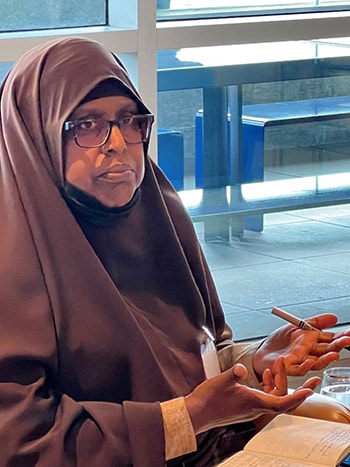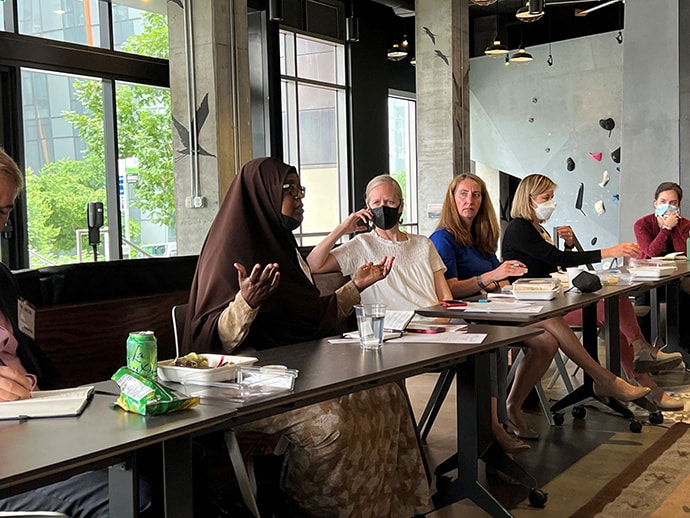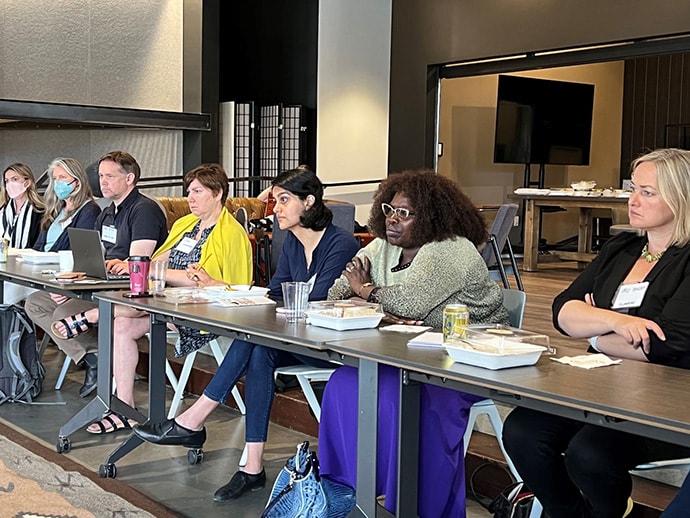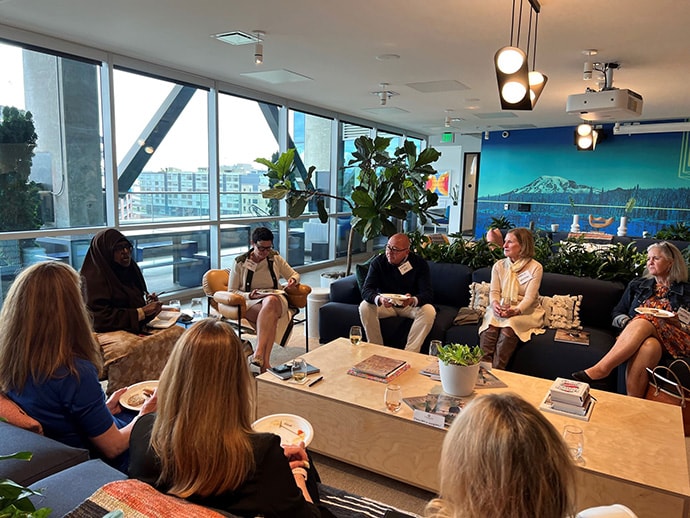By Lynn Schnaiberg
Trust and humility.
That’s what Degan Ali said is sorely needed in international aid and development at a June Global Washington roundtable on decolonizing global development and the role of U.S. based iNGOS. What does trust and humility look like? More trust in local people on the ground in the places iNGOs work. And more humility to listen to and learn from them.

Degan Ali. Photo: Akhtar Badshah
Ali, the executive director of Nairobi-based Adeso and a trailblazer in the movement to decolonize aid and rethink humanitarianism, put it this way. “If there was a crisis, God forbid, in Seattle, we would expect that level of dignity and respect that people would trust you all to know what you need and how you need it and when you need it. But that level of consideration and trust is not given to people in the Global South, unfortunately.”
A global leader in community-centered development, Ali is working to change both the conversation about aid and development and take concrete steps to change the sector. Briefly, she envisions the Global North ceding more resources, voice and power to the Global South. It’s a vision that supports self-determination and civil society in the Global South—with iNGOs walking the talk of cultivating local vision, leadership and capacity. (And one where donors increasingly give directly to local groups.) Ali acknowledges the decolonization conversation can be uncomfortable—especially for leaders of iNGOs who aren’t based in the places where their work is being done or who don’t represent those communities. But she says it’s necessary.
iNGOs in the Global Washington network have the chance to be part of that conversation and change, Executive Director Kristen Dailey told leaders at the roundtable. She sees Seattle as a potential leader in reform toward community-led, globally connected development. “We have the NGOs and entrepreneurs here in our community to evolve what global development looks like,” Dailey told the assembled leaders. “And it’s going to happen with or without us. … I hope you’re excited to join me in this journey.”

Photo: Akhtar Badshah
Trust surfaces as a theme when Ali describes the struggle of her mother, an internationally recognized environmentalist, to raise support for critical work in Somalia as the founder of Adeso. The organization found itself confronting a Western aid system that expected slick reports, written in English, and detailed reporting with audits from Western consultants. In other words, trust flowed from exhaustive documentation and formal credentials and pedigrees from external actors. But the actual work functioned with deep experience with local networks and earned trust in people on the ground.
“I understand the Western system. I understand the value of documentation and formal systems,” Ali explains. “But in process of professionalizing and becoming an industry, we’ve lost the value of trust and networks.”
Trust surfaces again as Ali, who worked for the United Nations and eventually took over Adeso leadership, recounts trying to generate aid community support for making cash transfers to vulnerable populations during the 2003 Somalia famine. She says many aid organizations balked, seeming to not trust local families to make good decisions with the cash and assuming the effort was doomed to fail. Adeso did, in fact, wind up pioneering successful large-scale cash transfers after securing backing from a major donor organization.

Photo: Akhtar Badshah
Trust is at the center again when Adeso trusted its own instincts to tackle what it knew was a root cause of the drought plaguing Somalia—namely, a lack of grassland management systems in the wake of civil war and governmental collapse, Ali says. But donors were pushing siloed humanitarian funding. So, Ali says, Adeso effectively turned that into economic development funding by paying people to do the needed environmental work. (Years later, Ali says, an aid worker told Adeso the impact of that work was clear: Growing swaths of greening grasslands were visible in satellite imagery from space.)
And trust comes up as Ali describes attending major international development meetings where she sees people of color sidelined from decisions that impact their communities.
It’s in the context of this environment that Ali calls for a new ecosystem of support. That ecosystem includes NEAR (Network for Empowered Aid Response), a network of local and national civil society organizations from the Global South working to reshape the top-down humanitarian and development aid system to one that is locally driven and owned. She tells iNGO leaders the effort (which she helped launch) is a way for the Global South to unite and advocate for its own issues and develop solutions.
When it comes to the sector as it exists today, Ali notes: “There are a lot of good people in the system. But the system doesn’t behave in a way that’s very good.”

Photo: Akhtar Badshah
To that end, Dailey urges Global Washington members to focus on the impact they want to make in the places they work and have decisions flow from that operational North Star. (Ali makes the point that if iNGOs successfully build local capacity, they should be able to exit.)
Going forward, Global Washington leaders will have chance to engage with system challenges in what Dailey calls “honest peer-to-peer conversations” leading up to Global Washington’s December conference, where the critical issues Ali raises will share center stage. Meantime, member organizations can start to examine their own products and practices—taking a critical eye to the photography and storytelling used to communicate mission (avoiding what’s been dubbed “poverty porn”), human resource policies, and operations generally. These things are baked into the Pledge For Change, spearheaded by Ali and the Centre for Humanitarian Leadership and supported by leaders from groups like Save the Children Canada, Oxfam UK and Care International.
Change is a work in progress. Stay tuned.
Thanks to APCO Worldwide and Jennifer Butte-Dahl for being such a gracious host for the luncheon panel and Tim Hanstad and the Chandler Foundation for hosting the evening reception.